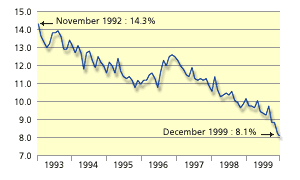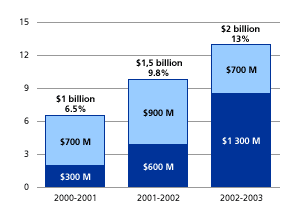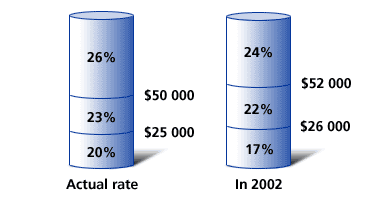|
Highlights
- Personal income tax reduction of $4.5 billion over the next three years:
- $1 billion in 2000-2001;
- $1.5 billion in 2001-2002;
- $2 billion in 2002-2003.
- Full indexation of the tax system.
- Commitments made at the Sommet du Québec et de la jeunesse more than satisfied.
- $675 million for economic development spending initiatives.
- $430 million for municipalities.
| I. |
OUTSTANDING ECONOMIC AND FINANCIAL RESULTS |
- Economic growth in 1999: 3.7%, while the most optimistic forecasts were 2.6%.
- Jobs created: 76 000 in 1999, the best performance since 1987, for the second year in a row.
- Jobs created for young people aged 15 to 24: 28 000, or 37% of all jobs created, even though this age group represents only 16 % of the population.
- Number of persons dependent on income security benefits: a decline of 40 000 in 12 months.
- Growth assumption: 3.3% in 2000, twice as high as the average rate recorded for the past 10 years.
- Unemployment rate: 8.1% in December 1999, the lowest rate since the 1976 Olympic Games.
- Unemployment rate in Montréal: 6.7% in December 1999, or less than the Canadian average for the first time since 1984.
Change in the unemployment rate
(as a percentage) |
 |
| Seasonally adjusted monthly data. |
| II. |
A $4.5-BILLION INCOME TAX REDUCTION |
- Personal income tax is cut by $1 billion in 2000-2001, $1.5 billion in 2001-2002 and $2 billion in 2002-2003.
- Full indexation of the tax system.
Personal income tax reduction
(as a percentage of total income tax)
|
 |
Shaded area: reduction announced in the 1999-2000 Budget Speech.
Unshaded area: additional reduction. |
Details of the income tax reduction
- Progressive reduction of the tax table rates by January 1, 2002.
- Additional income tax reduction for families.
- Full indexation of the tax system.
- Improvement of the tax system for self-employed workers.
| New tax table |
 |
A reduction geared to families and the middle class
- All taxpayers benefit from the income tax reduction: average tax cut of 13% for the 2.4 million households that pay income tax. The middle class and families will benefit even more than others.
| EXAMPLES OF INCOME TAX REDUCTIONS |
 |
|
Income |
Reduction |
 |
| Person living alone |
$30 000 |
16% |
$673 |
| Single-parent family with one child |
$30 000 |
32% |
$715 |
| Childless couple with one income |
$45 000 |
12% |
$663 |
| Couple with two children and one income |
$45 000 |
27% |
$1 133 |
| Couple with two children and two incomes |
$50 000 |
34% |
$1 733 |
| Couple with two children and two incomes |
$100 000 |
11% |
$1 803 |
 |
| III. |
$2.7 BILLION FOR HEALTH AND SOCIAL SERVICES |
Greater funding for the network
- $862 million has been earmarked for network institutions to enable them to balance their budgets.
- $877 million will serve to finance the cost increases required to maintain existing public services.
Increase and develop services
- $747 million will be used to increase public services and to develop new ones. Of this total, $21 million will be devoted to youth services.
Acquisition of new equipment
- An additional $200 million will be invested for purchasing equipment.
| IV. |
INVESTING MORE IN YOUNG PEOPLE AND IN EDUCATION |
Promoting quality education
- The education network will receive substantial additional funding: $200 million in 2000-2001, $300 million the following year and $500 million per year thereafter.
- $100 million is earmarked for universities, $40 million for school boards and $10 million for Cegeps beginning in 1999-2000.
- $24 million has been earmarked for modernizing the hospital run by the faculty of veterinary medicine in Saint-Hyacinthe.
Promoting excellence
- $24 million will be allocated over the next three years to increase the bursaries granted to master’s, doctoral and post-doctoral students by 40%.
- The non-taxable portion of bursaries will be raised from $500 to $3 000. In addition, scholarships granted to university students will be tax-free.
- 2 000 top-level athletes will receive a tax credit of between $1 000 and $4 000.
- $10 million per year will be granted to encourage involvement in amateur sports.
Promoting initiative
- A $240-million Youth Fund will be created in partnership. The government will inject $120 million into the Fund this year.
- $95 million has been set aside for measures to help young people.
- The government and the Fonds de solidarité des travailleurs du Québec (FSTQ) will each grant $10 million to finance more student internships.
Other measures
- $120 million will be granted to Valorisation-Recherche Québec to support projects carried out by teams of Québec researchers.
- $40 million will be provided over the next three years to support research teams.
- The Fonds de lutte contre la pauvreté will be maintained and will receive $160 million over the next three years.
| V. |
SUPPORTING THE TRANSFORMATION OF THE ECONOMY TO CREATE YET MORE JOBS |
Increasing private investment
- Enterprises will be able to take advantage of a full tax holiday for 10 years for all major investment projects. This exemption will cover income tax, tax on capital and the contribution to the Health Services Fund.
- This measure should generate investments of $5 billion over the next five years and create 16 000 jobs.
- The 125% accelerated depreciation and the two-year capital tax holiday for manufacturing investments and computer equipment will be extended until March 31, 2005.
- Several other measures will support investment in Québec:
- improvement of the budget package for the PIJCPF;
- improvement of the Garantie-PME program;
- revision of the immigrant investor program;
- financial support for the restructuring of subcontracting, particularly in the aerospace industry;
- property tax exemption for all industrial anti-pollution equipment.
E-commerce, a promising sector
- 10 000 SMEs should be able to benefit from a tax credit equal to 40% of the expenses incurred to develop a transactional web site. A sum of $126 million will be made available for this purpose over the next three years.
- Investments in fibre optics in regions that are poorly served in this regard will be granted an accelerated depreciation of 125%. A sum of $15 million will be allocated for this purpose.
- A budget of $120 million has been earmarked for the next three years to allow close to 200 000 families that are eligible for family allowances to hook up to the Internet.
Québec infrastructure program
- $290 million will be allocated to an infrastructure program: $175 million for municipal projects, $25 million for environmental projects and $90 million for transportation projects.
- $5 million will be devoted to linking Mont-Saint-Hilaire to Montréal by a commuter train.
Other measures
- A program to help the victims of pyrite damage, particularly less affluent households, will be introduced.
- $2 million will be used to provide SMEs with additional assistance for developing francization programs, and language classes for immigrants in the workplace.
| VI. |
$310 MILLION FOR REGIONAL DEVELOPMENT |
Help for certain specific regions
- Gaspésie-Îles-de-la-Madeleine: this region will receive an additional $26 million, i.e. $9 million for road work, $12 million for tourism infrastructures and $5 million for job creation in the forestry industry.
- Maritime policy: the minimum size of boats providing entitlement to the tax credit will be reduced by half.
- Mining exploration: $5 million will be used to create a program to support junior exploration companies. And $5 million will serve to add a component to the mining exploration assistance program targeting the Abitibi-Témiscamingue region.
- Sorel and Tracy: this population centre will receive a budget of $21 million over the next three years to promote the implementation of projects developed locally.
- "Aluminum Valley": aluminum processing firms that locate in the Saguenay-Lac-Saint-Jean region will receive a tax credit equal to 40% of the salaries of employees engaged in production and marketing during the year following their recruitment.
Assistance for the forestry industry
- $100 million will be granted to INNO-PAP to support the modernization of the pulp and paper industry.
Assistance for rural areas
- $3 million will be used to renew the program for rural officers, the program to support traditional farm products and the program to finance Solidarité rurale du Québec.
- The government has made a commitment to devote $300 million a year to funding financial instruments specific to the farming sector.
Other regional investments
- $25 million will be used to finance the extension of the gas network in order to service industrial parks and farming enterprises.
- Small businesses will be able to take advantage of a loan guarantee program for start-ups. The government will cover 80% of losses incurred up to $100 000.
- $30 million will be allocated to the Société des établissements de plein air du Québec to make investments over the next three years.
| VII. |
ENHANCED SUPPORT FOR CULTURE |
- Book publishing: a tax credit for certain labour costs will come into effect as of today.
- Institutions and museums: $29.5 million will be allocated to these institutions this year.
- Cultural facilities: $30 million will be invested to support these facilities and to restore cultural property.
- TV5 television station: $8 million will serve to support the development of this station.
- Architectural heritage: $43 million will be used to renovate the Séminaire de Nicolet and $18 million to renovate the Institut de tourisme et d’hôtellerie.
- Religious heritage: an additional $20 million will be injected into the program to preserve Québec’s religious heritage.
| VIII. |
$430 MILLION FOR MUNICIPALITIES |
- The municipal contribution introduced in 1998 will be abolished.
- In return, the government will keep the proceeds from the tax on telecommunications, natural gas and electricity (TGE) and will assume responsibility for equalization and assistance to RCMs and main cities, which, until now, have been funded by the TGE tax.
- $155 million will be allocated to municipalities to facilitate the transition to the new system and to implement the action plan to strengthen urban areas and RCMs.
- In all, including the $175 million for municipal infrastructures, municipalities will receive an additional $430 million in their fiscal years 2000, 2001 and 2002.
|


